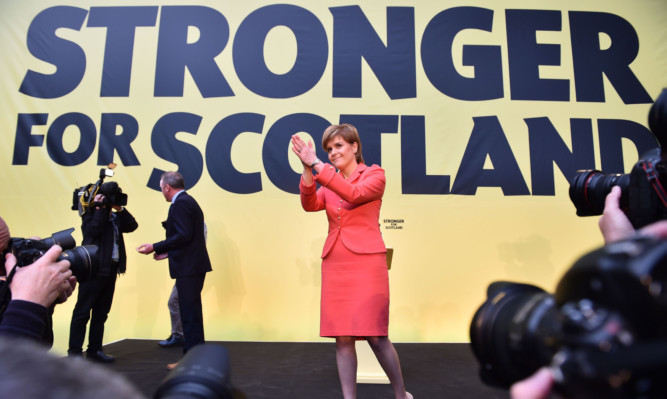First Minister Nicola Sturgeon has said that an “out” vote in a poll on EU membership could justify a second referendum on Scottish independence.
The SNP leader has refused to rule out staging a second independence vote after the 2016 Holyrood elections.
However she said there would need to be a “change of circumstances” to justify another referendum, such as the Tories’ proposed referendum on EU membership.
Her comments came after she launched the SNP election manifesto with a pledge that her party would not only fight to “make Scotland stronger” but would also use its influence to bring about “real and positive change” for ordinary people across the UK.
In an interview with the Daily Mail she said: “I’m quite clear – a vote for the SNP at this election, I’m not taking that as a mandate for another referendum.
“So it would have to be something like the EU situation, if there was an out vote across the UK and Scotland wants to stay in.”
She added: “If I put a commitment to a referendum in any future SNP manifesto, people have to vote for that manifesto, so I can’t do that lightly. I have to be sure that there is a change of circumstances that has led to people by majority opinion wanting another referendum.”
Support for the SNP has been on the up, despite the vote against independence last year, with polls suggesting there could be a record number of Scottish nationalists at Westminster.
With the election apparently on track for another hung parliament, that could see Ms Sturgeon and her party holding the balance of power across the UK.
The SNP manifesto makes the case for “modest” increases in public spending, resulting in “at least £140 billion extra investment” across the UK.
This would see an additional £9.5 billion above the rate of inflation for the NHS by 2020/21, a total increase of £24 billion.
SNP MPs would back an increase in the minimum wage, wanting this to rise to £8.70 an hour by 2020, and would also vote in favour of the reintroduction of the 50p rate of income tax for top earners, as well as mansion tax and a bankers’ bonus tax.
While the tax changes are similar to those set out by Labour, one key difference between the two parties remains over the issue of Trident.
The Nationalists are opposed to the UK having nuclear weapons, with Ms Sturgeon arguing that not renewing Trident is a “a very, very real way in which we can free up resources to spend on giving our children a better future”.
